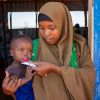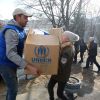“Standing by the people”
Violence in Darfur is escalating, and hundreds of thousands are fleeing. Germany is providing additional funds – for drinking water, food and medical care.

At daybreak in Tawila, long queues of people with water containers are already forming. Supplies in this refugee camp in Sudan’s Darfur region are scarce, latrines are overflowing, and cholera is spreading. Following the capture of the major city of Al-Fashir in western Darfur by the Rapid Support Forces (RSF) militia, conditions in camps like Tawila have worsened dramatically.

Humanitarian situation deteriorates further
Sudan is currently facing the world’s largest humanitarian crisis. According to the UN Refugee Agency (UNHCR), more than 26,000 people have recently arrived in Tawila camp – around 60 kilometres from the captured city of Al-Fashir. “New arrivals are reporting dangerous journeys and terrible abuse,” wrote UN High Commissioner for Refugees Filippo Grandi on the platform X. “The bloodshed following the RSF’s capture of Al-Fashir is appalling,” said Federal Development Minister Reem Alabali-Radovan. The victims are above all the local population, she said, “and further waves of racist violence, hunger and displacement are looming in a region that has already suffered for years under the consequences of Sudan’s war.”
How did the crisis in Sudan arise?
The causes run deep. Three decades of dictatorship under Omar al-Bashir, civil wars and systematic exclusion have left the country in ruins. After al-Bashir’s overthrow in 2019, a civilian–military transitional government was supposed to initiate reforms and prepare elections – until the army under Abdel Fattah al-Burhan staged a coup in 2021. At the same time, the power struggle escalated with the Rapid Support Forces – a militia with roots in the Arab mounted groups held responsible for war crimes and ethnic cleansing during the Darfur conflict. When the RSF was to be integrated in the regular army in 2023, the conflict erupted openly.
Why has the conflict intensified?
Months of siege around the city of Al-Fashir have shifted the balance of military power in Darfur. With the RSF’s advance, mass killings, torture, rape and ethnically motivated violence are once again feared. At the same time, regional interference and continued arms supplies have further fuelled the war.
What is the humanitarian situation in Sudan?
The human rights situation and the economic, social and humanitarian conditions have deteriorated dramatically throughout Sudan since the fighting began in spring 2023. In many regions, basic supplies are collapsing: drinking water, food, medicine, fuel and electricity are all scarce. The healthcare system is on the brink of collapse – around 70 to 80 per cent of facilities are permanently closed. The violence has triggered mass displacement: even before the latest developments, the UNHCR reported in September 2025 that around 12 million people had already fled their homes, with 7.4 million displaced within the country and others seeking refuge in neighbouring states such as Chad, South Sudan and Egypt.
Overcrowded camps and poor sanitation are increasingly leading to deaths from infectious diseases such as measles and cholera. Hunger is rising sharply. According to the World Food Programme, around five million people in Sudan are at acute risk of famine, while some 25 million face food insecurity. Children are particularly affected: about 24 million are impacted, with around 15 million unable to attend school. Given the recent developments, Sudan’s humanitarian situation is expected to worsen further.
How is Germany helping in Sudan?
Germany is expanding its support for the people of Sudan. “In the current confusing and dangerous situation, German development cooperation continues to stand by those affected,” said Federal Development Minister Reem Alabali-Radovan. Germany is supporting UNICEF and the UN World Food Programme (WFP) in Darfur in efforts to secure access to clean drinking water and basic health services, for example.

Serap Güler, Minister of State at the Federal Foreign Office, emphasised only a few days ago during a visit to Sudan and Chad: “Germany is willing to continue its strong political and humanitarian commitment. After providing 125 million euros in humanitarian aid for Sudan and the affected neighbouring states at the Sudan Conference in London in April, we are now expanding our support once again.”
Germany was providing its humanitarian partners with an additional 16 million euros, said Güler. “I will discuss with the UN aid organisations and with Sudan’s committed civil society how we can use these funds above all to alleviate the hunger crisis and the consequences of sexualised violence,” she added. She said that an end to the war in Sudan was possible. “Foreign Minister Wadephul and I are working persistently to help bring this terrible and far too overlooked war to an end.”


